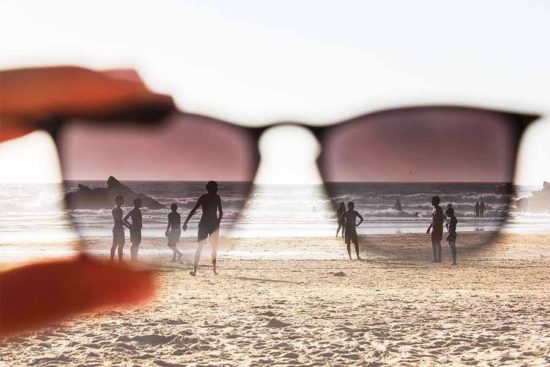April is Women's Eye Health and Safety Month - click here for FREE healthy vision tips
Menu

With summer comes regular reminders to use sunscreen. This is because UVB rays, the primary cause of sunburn and sun-related eye damage, are at their strongest in the summer. However, people who venture outdoors need to safeguard their eyes from exposure to UV light year-round, says the American Academy of Ophthalmology (AAO). This is because UVB rays can harm your eyes at any time of year, especially when they reflect off surfaces like snow or ice.
According to the World Health Organization, long-term exposure to ultraviolet radiation from the sun is not only harmful to the skin, but is equally damaging to the eyes and could lead to permanent damage. Without adequate eye protection, your chance of developing eye disorders such as blurred vision, age-related macular degeneration, cataracts, and photokeratitis will increase as the damaging effects of UV exposure are cumulative. In fact, exposure to the sun’s UVB rays appears to be a major risk factor for the development of cataracts.
We’d like to take advantage of this opportunity to help you maintain good eye health by providing you with the following tips to protect your eyes from harmful UV rays.
A wide-brimmed hat with a minimum 3″ wide brim has been demonstrated to greatly reduce sun exposure. Hats shield your skin and eyes from the sun and provide a long-lasting sun barrier, unlike sunscreen, which must be reapplied every two hours. The Skin Cancer Foundation recommends hats made of dark-colored, tightly woven fabrics like canvas, denim, wool, or synthetic fibers for absorbing UV rays. If you can see light through the fabric when you hold it up to the light, it does not provide adequate safety. Look for hats that have UV protection built in, with a minimum UV Protective Factor (UPF) of 30.
When shopping for sun glasses, look for ones labeled “UV400” or “100% level of protection against UVA and UVB radiation.” Less expensive sunglasses that have these ratings can be just as effective, just avoid products that don’t match these standards. It is important to know that UV protection levels are not dependent on lens color or shade so don’t just grab a pair with the darkest lenses and think you are covered. UV-blocking contact lenses can provide some defense from the sun’s rays, but they can’t completely shield the eye. Also, be aware that even on overcast days, UV radiation can penetrate clouds so you should wear sunglasses whenever you venture outside to safeguard your eyes from UV Damage and possible loss of vision.
Although most people are aware of the harmful effects of staring directly at the sun, beach goers frequently ignore this advice and remove their sunglasses when laying down to soak in the rays, believing that closing their eyes will protect them from the sun. Although your eyelids do hide your eyes from direct sunlight, they can only offer limited defense and not surprisingly, eyelids are frequently the first place affected by cancer. Small amounts of ultraviolet light passing through your eyelids can cause visual degradation over time, resulting in cataracts, vision loss, corneal burns, or cancer.
Photosensitivity is a type of immune system reaction brought on by exposure to sunlight. As per the AAOs sun safety survey, one out of every three adults take medication that could make their eyes more prone to UV light damage. Antibiotics, birth control, estrogen tablets, and psoriasis therapies containing psoralen are examples. Examine your medication labels to determine if they may cause photosensitivity, and if this is the case, make every effort to protect your skin and eyes from the sun due to increased risk of sun damage . Furthermore, while everyone is susceptible to harm from UV rays, individuals with light skin or blue or green eyes have less protective melanin and should take precautions to avoid the midday sun, to wear additional protection like protective clothing and broad spectrum sunscreen for their skin, and to don proper eye protection.
Make it a habit to put on UV-protective sunglasses before buckling up. Most people incorrectly assume that car windows shield you from UV rays. However, a recent study shows that only 14% of all side windows provide adequate UV protection. In addition, If you drive frequently in bright sunlight and are subject to chronic exposure, it is recommended that you wear wraparound sunglasses to shield yourself from the sun’s harmful rays sneaking in from the sides. Choose a frame that surrounds your eyes and fits closely to the shape of your face to guard against glare to prevent cumulative UV damage to your eyes.
We hope you find these tips useful and make it a priority to protect your eyes.
Improving your vision is our vision. Clinical research has shown that the specific amino acids, antioxidants, and vitamins in our Can-C Eyedrops, Nac-C Plus Capsules and ARMeD Advanced Retinal Support Tablets can protect against and even heal common eye conditions. Wise Choice Medicine’s ocular support product line is designed to boost and improve eye health by supporting the eyes’ natural ability to recover from stress factors such as UV damage.
Free shipping on all US orders
Your data is safe
Satisfaction guaranteed
Email support is always available

*Disclaimer: The above statements have not been evaluated by the FDA. They are not intended to diagnose, treat, cure or prevent any disease or condition.
If you have a health condition or concern, consult a physician or your alternative health care provider.
Always consult a medical doctor before modifying your diet, using any new product, drug, supplement, or doing new exercises.
Use of this site constitutes acceptance of our Shipping and Returns Policy, our Terms and Conditions and our Privacy & Cookies Policy
| Cookie | Duration | Description |
|---|---|---|
| cookielawinfo-checkbox-analytics | 11 months | This cookie is set by GDPR Cookie Consent plugin. The cookie is used to store the user consent for the cookies in the category "Analytics". |
| cookielawinfo-checkbox-functional | 11 months | The cookie is set by GDPR cookie consent to record the user consent for the cookies in the category "Functional". |
| cookielawinfo-checkbox-necessary | 11 months | This cookie is set by GDPR Cookie Consent plugin. The cookies is used to store the user consent for the cookies in the category "Necessary". |
| cookielawinfo-checkbox-others | 11 months | This cookie is set by GDPR Cookie Consent plugin. The cookie is used to store the user consent for the cookies in the category "Other. |
| cookielawinfo-checkbox-performance | 11 months | This cookie is set by GDPR Cookie Consent plugin. The cookie is used to store the user consent for the cookies in the category "Performance". |
| viewed_cookie_policy | 11 months | The cookie is set by the GDPR Cookie Consent plugin and is used to store whether or not user has consented to the use of cookies. It does not store any personal data. |
Any questions? We’re here to help.